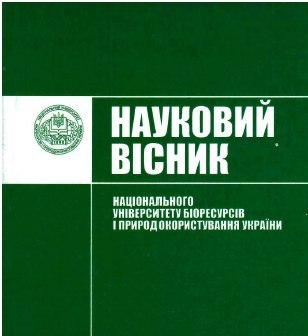Вorrowed words in the english terminology of forestry
DOI:
https://doi.org/10.31548/philolog0(276).2017.094%20-%20104Abstract
It has been analyzed the borrowed words in the English terminology of Forestry, studied their etymology, semantic peculiarities, classification types, and functioning. The study of origin and source of a borrowed unit and its use reveals the entire scope of the definite meaning within the specialized language.
The borrowed stock of words is referred to: loan word (when a word is adopted from one language and is incorporated in a recipient language without translation) and loan translation (a calque, when a word is borrowed from another language by literal translation of its components).
The research has shown that the word stock of the English terminology of Forestry is etymologically heterogenous. In the process of historical development of the forestry science and its technical appliances, the vocabulary was enlarged and enriched by loans and loan translations. The largest source of borrowing was Latin due to the fact that it was the Lingua Franca of science and academic centers in the previous centuries. Then new concepts were traditionally named using loans or components of classical languages. Some words had earlier come into Latin from Greek. Besides Latin, a great number of terms of Germanic origin (in particular Scandinavian ones) have been presented and they cannot be dated.
The borrowing process was also stimulated by the different centers of forestry where professionals were native speakers of German, French, Italian and numerous borrowed units have been incorporated into the forestry science. Moreover, Latin and Greek words have commonly been used in systematic or taxonomic names for plants and animals. There have been traced a shift in semantic meaning of some terms and changes of the former terms and assimilation of new ones.
At the current stage in the development of the English terminology of Forestry, borrowing as one of the sources of specialized stock enrichment is primarily carried out based on traditional word formation models using loan words or combinations of Latin or Greek elements and native English word stock.
The prospect of the further research is intended to present the semantic analysis of the forestry terms and compare their meanings and functioning with the relative units in adjacent terminology systems.
References
Vovchanska, S. I. (2012). Zapozychennya yak rezultat terminologichnoyi nominatsiyi (na materiali nimetskoyi terminologiyi marketyngy [ Borrowing as a result of the terminological nomination (based on the German terminology of marketing) ]. – Scientific Bulletin of the Volyn National University of Lesya Ukrainka. Series: Philological Sciences. Linguistics, 22, 191-195.
Vovchanska, S. I. (2014). Nimetska fakhova mova marketyngy [ The German specialized marketing language: structural and semantic, linguistic and pragmatic, and functional aspects : Thesis : Ivano-Frankivsk – Odessa, 396.
Dyakov, A. S., Kyyak, T. R., Kudelko, Z. B. (2000). Osnovy terminotvorennya : semantychni ta sotsio-lingvistychni aspekty [ Fundamentals of Terminology: Semantic and Sociolinguistic Aspects ] – Kyiv : Kyiv-Mogyla Academy, 218 p.
Kyyak, T. R. (2006). Zapozychennya ta internatsionalizmy u fakhovykh movakh [ Borrowings and internationalisms in the specialized languages ] / T. R. Kyyak // Bulletin of Zhytomyr State University named after Ivan Franko, 27, 32-34. Available at: http://eprints.zu.edu.ua/1068/1/06 ktpifm. pdf.
Kochergan, M. P. (2001). Vstup do movoznavstva [Introduction to Linguistics : Textbook ]. – Kyiv : “Akademiya”, 368.
Myklash, L. T. (2014). Semantyko-morfologichnyy analiz anglomovnykh terminiv lisovoho gospodarstva [Semantic and morphological analysis of the English forestry terms: forest, wood, silva / L. T. Myklash // Scientific Bulletin. Series: Linguistics, 129. – Kirovograd, 507-512.
Myklash, L. T., Magura, B. O. (2013). Anglo-Ukrayinskyy slovnyk lisotekhnichnykh terminiv [the English-Ukrainian Dictionary of Forestry and Forest Engineering Terminology] – Lviv: Kamenyar, 124 p.
Nepyyvoda, V. P. (2008). Problema vidtvorennya anglomovnykh terminiv ?sustainability development’ і ?sustainability’ v ukrayinskiy pravnychiy movi [The problem of conveying the meaning of the English terms ?sustainability development’ and ?sustainability’ in the Ukrainian legal language] / Vasyl Nepyyvoda // Ecological Bulletin, 3, 24-26.
Salamakha, M. Ya. (2016). Anglomovna terminosystema okhorony dovkillya: struktura, semantyka, pragmatyka [The English terminology system of environmental protection: structure, semantics, pragmatics : Thesis. – Lviv, 317.
Smirnitsky, A. I. (1956). Leksikologiya angliyskogo yazyka [ Lexicology of the English language ] – Moscow, 260.
Ukrayinska mova : Entsyklopedia (2004). [ The Ukrainian language: Encyclopedia ] / V. M. Rusanivskyy, O. O. Taranenko, M. P. Zyablyuk and others. –2nd ed. – Kyiv: Ukr. Encyclopedia, 824.
trail. Available at: http://www.etymonline.com/index.php?allowed_in_frame=0&search=trail
habitat. Available at: http://www.merriam-webster.com/dictionary
habitat. Available at: https://www.worldwildlife.org/habitats/forests
Online Etymology Dictionary. Available at: https://www.etymonline.com
Downloads
Published
Issue
Section
License
Relationship between right holders and users shall be governed by the terms of the license Creative Commons Attribution – non-commercial – Distribution On Same Conditions 4.0 international (CC BY-NC-SA 4.0):https://creativecommons.org/licenses/by-nc-sa/4.0/deed.uk
Authors who publish with this journal agree to the following terms:
- Authors retain copyright and grant the journal right of first publication with the work simultaneously licensed under a Creative Commons Attribution License that allows others to share the work with an acknowledgement of the work's authorship and initial publication in this journal.
- Authors are able to enter into separate, additional contractual arrangements for the non-exclusive distribution of the journal's published version of the work (e.g., post it to an institutional repository or publish it in a book), with an acknowledgement of its initial publication in this journal.
- Authors are permitted and encouraged to post their work online (e.g., in institutional repositories or on their website) prior to and during the submission process, as it can lead to productive exchanges, as well as earlier and greater citation of published work (See The Effect of Open Access).

